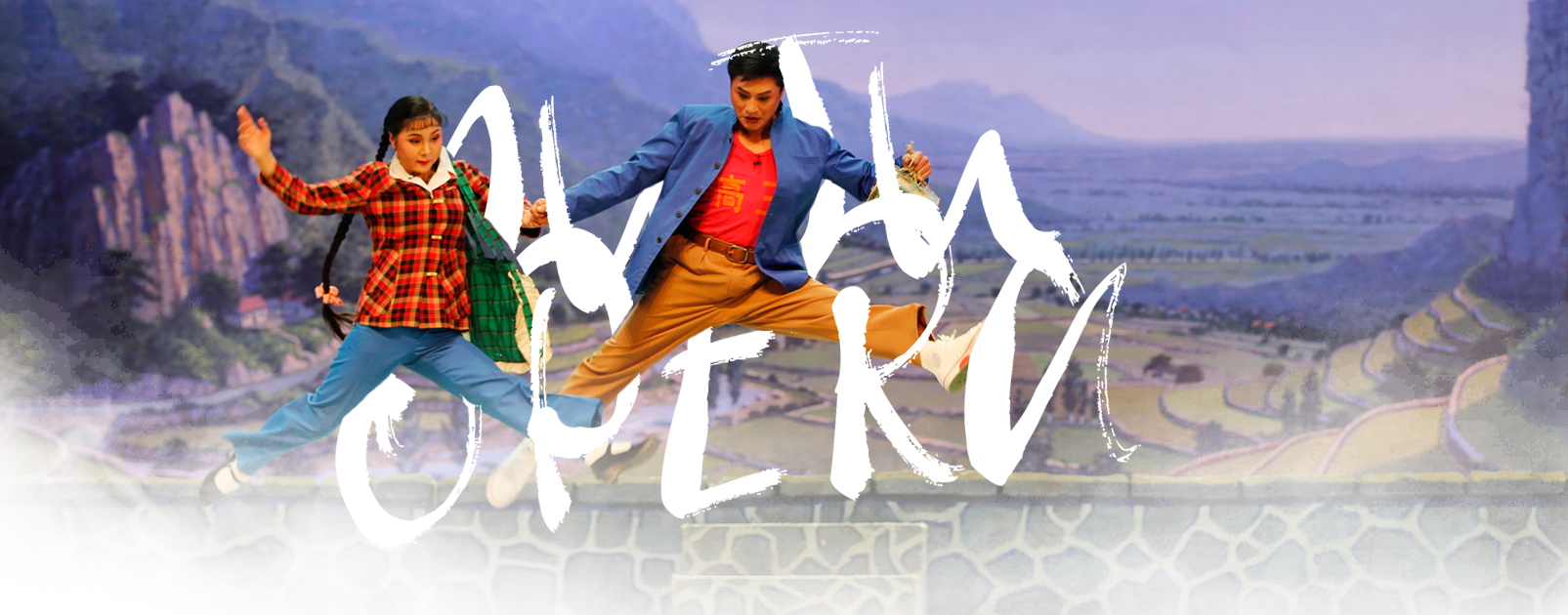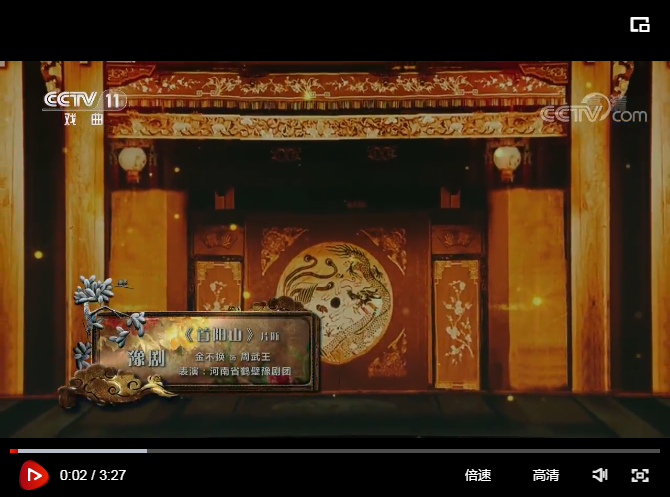
The Yuju opera (Yu is the single-character abbreviation for Central China’s Henan province, where the opera originated), is one of the five major operas in China together with Peking opera, Pingju opera, Yueju opera, and Huangmei opera. It is the country’s leading local opera with the largest number of performers and troupes. It inherits the quintessence of the vernacular clapper opera (Henan bangzi) which it reformed and developed. It features strong rhythm, rhythmic melody, vigorous tones, clear diction, and high expressiveness.

In its early stage, Yuju opera was commonly called Henan clapper opera (Henan bangzi) because of the common practice of naming a local opera after the primary percussion instrument in its orchestral accompaniment. It was only after the founding of the People's Republic of China in 1949 that the provincial abbreviation Yu became its official title. Yuju opera is popular in Henan and other provinces and regions, including Hebei, Shandong, Shanxi, Hubei, the Ningxia Hui autonomous region and the Xinjing Uygur autonomous region, making it one of the most influential operas in China.
Origin
Yuju opera was born at the end of the Ming Dynasty (1368-1644) and the beginning of the Qing Dynasty (1644-1911) in Henan province. At the beginning, it was merely a vocal performance without any musical accompaniment or make-up. The clear diction and high expressiveness of the opera made it very popular among people in different walks of life in Central China and led to its rapid development.
Meanwhile, it was influenced and inspired by other folk ditties popular in Henan province, and evolved into an independent operatic form.
After the Revolution of 1911, Yuju opera was performed in famous urban teahouses such as the Zhixiang Teahouse, the Puqing Teahouse and the Tongle Teahouse, where it competed with Peking opera.
After the founding of the People’s Republic of China, troupes of Yuju opera were established in China. A large number of new songs and dramas emerged, expanding the repertoire and prompting the opera’s full development.
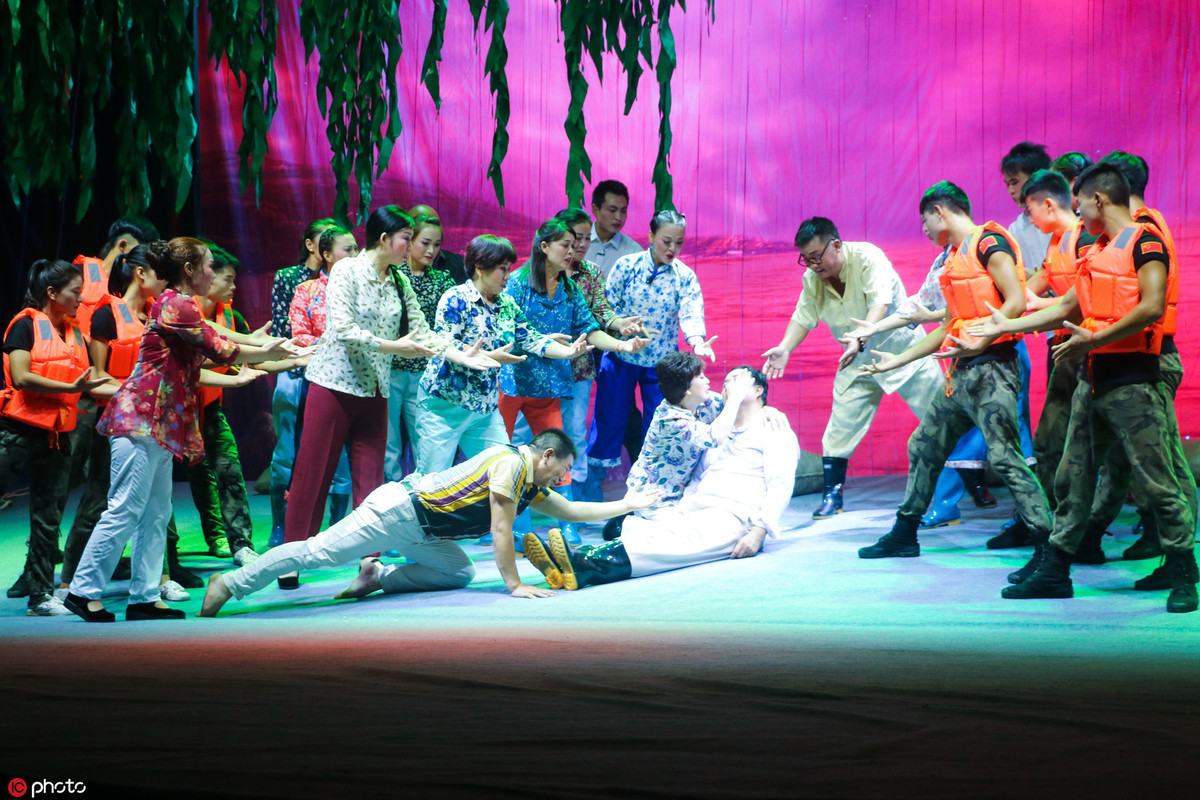
Tunes
Tunes are essential to an operatic form. Yuju opera tunes are magnificently sonorous, rising and falling in cadence with strong emotional intensity. They are known for their bright rhythm and displays of sharp conflict. They tell stories not only of lighthearted comedy, but also of emperors and generals.
Because of the dialect difference within Henan province, multiple schools with their own diction and vocal styles were formed based on location. Each of them thrived. The five major tonal schools of the Yuju opera include Xiangfu Tune, which thrived around Kaifeng, Yudong Tune, popular around Shangqiu, Yuxi Tune, local to Luoyang and Shahe Tune which was most prominent in the Shahe River drainage area. The main divisions were the Yudong and Yuxi tunes. Yudong tunes were always used to express a comic style, while Yuxi tunes had more tragic effects.
Yuxi tunes from Luoyang tell stories in what is generally a very sorrowful manner. They usually have a tragic theme. The actors enunciate carefully to convey the story-line and speak in low and deep tones. With their tragic themes they are noted for solemn and stirring music. Important performers in Dan or female roles include Chang Xiangyu (1923-2004), Cui Lantian (1926-2003) and Mao Lanhua (1924-1981).
The Yudong style originated from Shangqiu in Henan province. The actors alternate between a natural voice and falsetto to perform impassioned musical themes. Leading players in roles of Laosheng (the old male role) include Tang Yucheng (1895-1973), Yang Qichao (1931-1993) and Liu Xinmin (1937-2003).
Roles
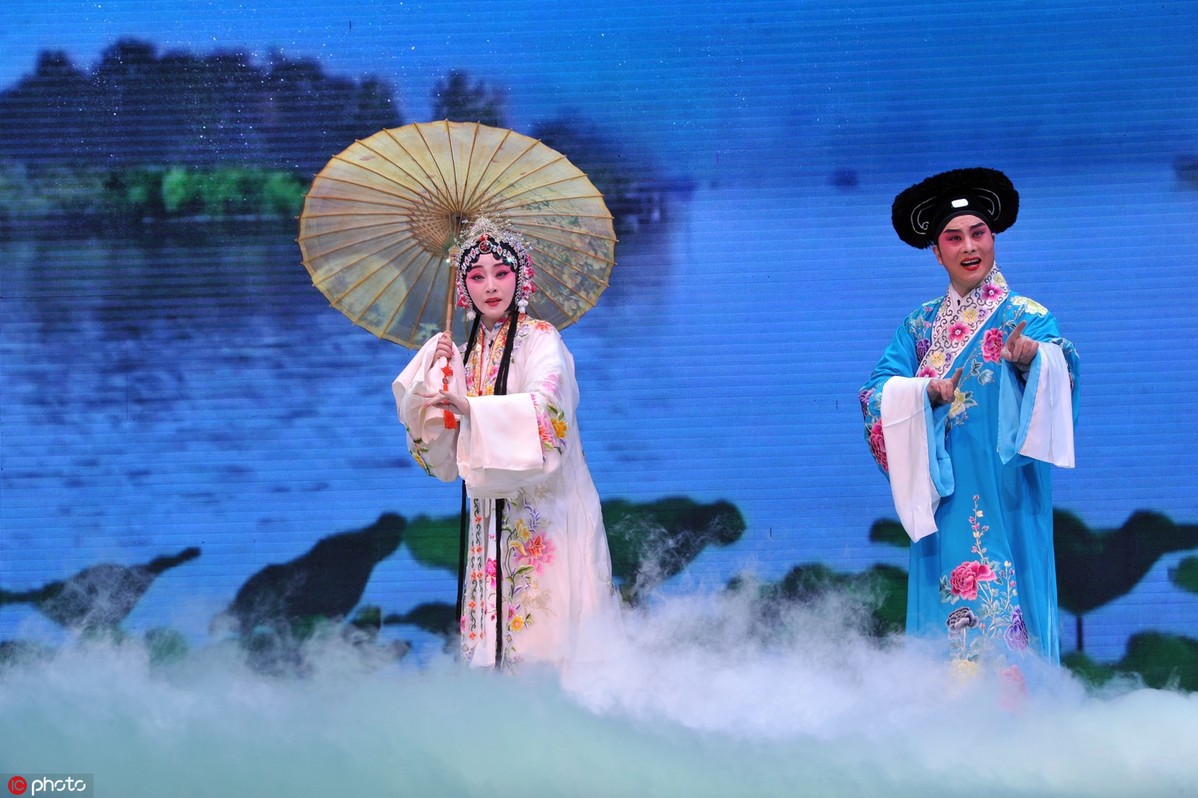
Yuju opera has four main role types: Sheng (male), Dan (female), Jing (male roles with painted faces and forceful characters) and Chou (clown).
The Sheng role group is divided into Laosheng (elderly male), Xiaosheng (young men) and Biansheng (substitute of Sheng, generally a minor character which is then included into Laosheng).
The Jing role (painted faced male role) group is divided into Zhengjing (the character excels at singing), Fujing (the character features acting, action and modeling), Wujing (the character is good at martial arts) and Maojing (the character depicts gods and deities with a twisted body and exaggerated modeling).
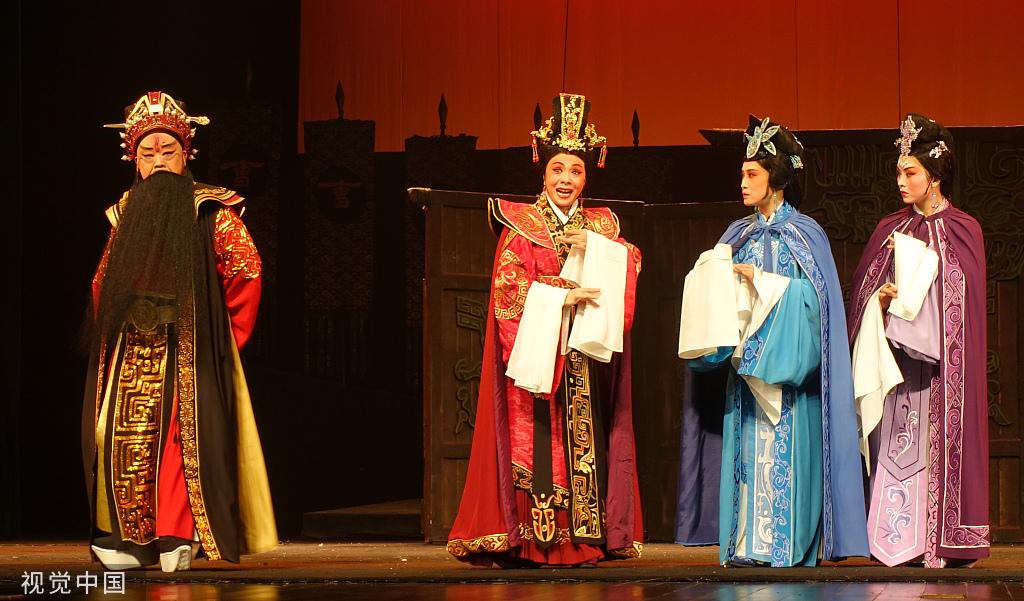
Dan is divided into Zhengdan (dignified, solemn and decent character such as a clever wife or a wise mother), Xiaodan (young woman), Laodan (elderly female), Wudan (valorous female) and Caidan (amusing women).
Costumes
In traditional Yuju opera, multiple vibrant colors are used to create contrasts which clearly show the identities and personalities of the characters.

Yuju opera has a profound color culture which represents a special aesthetic and cultural concept. Color, design, and materials are elaborated according to the image of the character. The color also presents the age, social status and idea of the character, correlating light and setting. Official characters must follow a standard dress code; for example, military officers and civil officials wear costumes with different dragon designs.
Material plays an important role in Yuju opera costuming. Traditional Yuju opera costumes usually use dense fabric with strong flexibility. Under stage lighting it brings the audience an enjoyable beauty.
Musical Instruments
The orchestral accompaniment initially consisted of "one drum, two gongs, three string instruments, a clapper and a cymbal". Sometimes people used a large cymbal and a big Chinese horn to make the opera performance grand and magnificent.
String and wind instruments in Chinese opera are Daxian (a four-stringed plucked instrument with a full-moon-shaped sound box), Erxian (Banhu, a bamboo or wooden-bowed two string instrument with a thin wooden soundboard) and Sanxian.
The Banhu was introduced to Yuju opera in 1930, at first leading to some slight improvements. It finally became the main instrument of Yuju opera.
In the 1950s, more string and wind instruments were introduced to Yuju opera including the Erhu, Pipa lute, Flute, Sheng and violoncello.
Yuju Opera Classics
Chaoyang Village (Chaoyang gou)

Yinhuan, a girl from the city and her fiancé Shuanbao agreed that after graduation from high school they would go Shuanbao’s hometown in Chaoyang village to take up agricultural production. Shuanbao returned to Chaoyang village first while Yinhuan was restrained by opposition from her mother. Later, Yinhuan was persuaded by Shuanbao and finally came to the countryside. But because the girl was weak in health, she changed her mind. After learning her mother was seriously ill, she left Chaoyang village and went home immediately regardless of advice from Shuanbao and his mother. On the way home, she met with the secretary of the Party branch and was instructed by him that she shouldn’t give up doing agricultural production in the countryside. When Yinhuan arrived home, she found that her mother had been malingering. She criticized her mother and resolutely returned to Chaoyang village. Yinhuan’s mother later came to meet Shuanbao’s parents and decided to settle down in Chaoyang village.
Thrice on Board the Palanquin (San shangjiao)
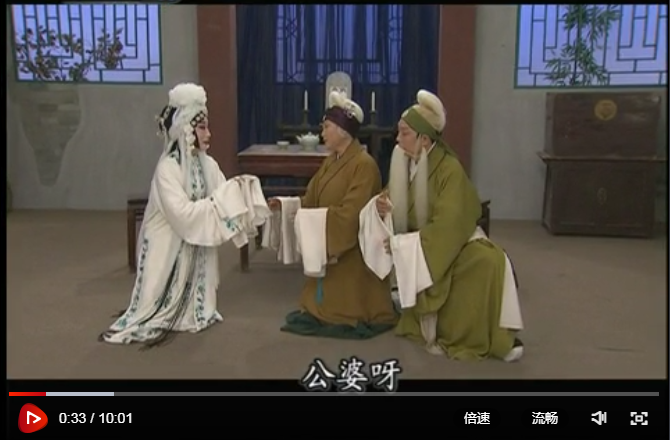
During the Wanli Period of the Ming Dynasty (1368-1644), Zhang Bingren, son of Zhang Juzheng, a high-level official in the court, was attracted by the beauty of Lady Cui, wife of his classmate Li Tong, and came to have evil ideas. Zhang Bingren invited Li Tong to attend a banquet and poisoned him to death. Li’s father complained about Zhang to a government official named Huang Chengyu. But since Huang Chengyu feared the power of Zhang’s father, he concluded thatLady Cui was Zhang’s concubine. Cui claimed a lot of money from Zhang Bingren to support the parents of her dead husband. She also made appointments with Zhang purporting to want to marry him. First, she requested that Huang Chengyu should be their matchmaker. And second, there should be no lights in their wedding room the very night of their wedding. Third, she requested that Zhang Bingren should follow Chinese traditions by grievously attending a burial ceremony for Li. Zhang followed all these instructions. But, before the wedding ceremony, Cui couldn’t bear to leave the parents of her dead husband or her baby. After a series of mental struggles, she bid farewell to them. Finally, Cui killed Zhang Bingren in the bridal chamber and then put an end to her own life.
